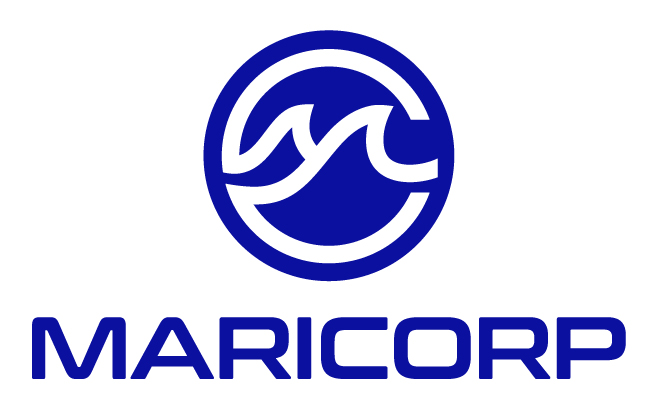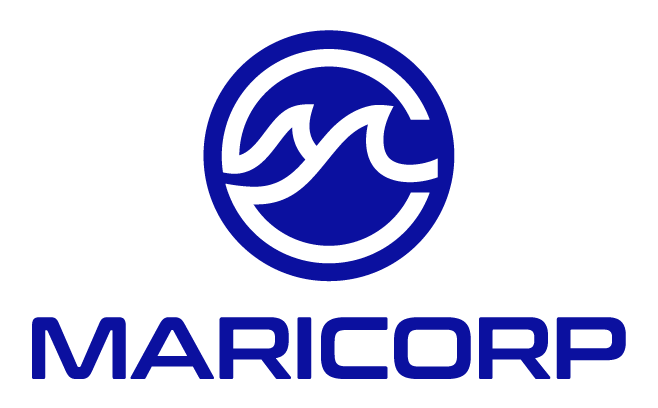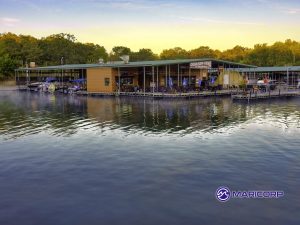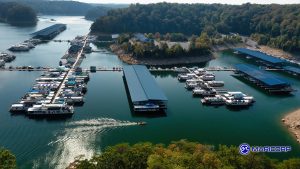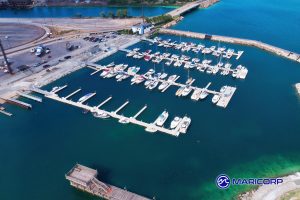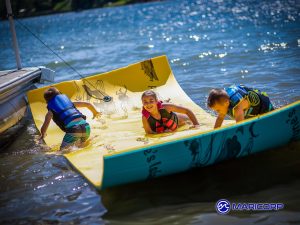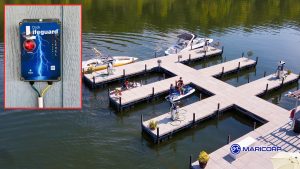NOAA Forecast Above Average Hurricane Season for 2024
Implications for Marina Owners and Operators
The National Oceanic and Atmospheric Administration (NOAA) has recently announced a forecast predicting an above-average hurricane season. This prediction is influenced by a combination of the transition from El Niño to La Niña and the extreme warmth of Atlantic Ocean surface temperatures. For marina owners and operators, understanding these factors and their potential impacts is essential for effective preparation and risk management.
The El Niño to La Niña Transition
The El Niño-Southern Oscillation (ENSO) cycle, which includes El Niño and La Niña phases, plays a significant role in global weather patterns. Currently, we are experiencing a transition from El Niño to La Niña, which has several implications for hurricane activity:
- Reduced Wind Shear: La Niña conditions normally reduce vertical wind shear in the Atlantic basin. This reduction in wind shear allows for more robust storm development and intensification.
- Increased Moisture: La Niña can increase atmospheric moisture, providing additional fuel for hurricanes.
- Enhanced Stability: The atmospheric stability associated with La Niña conditions can contribute to a more favorable environment for hurricane formation.
Extreme Warmth of Atlantic Surface Temperatures
The Atlantic Ocean’s surface temperatures have been exceptionally warm, significantly influencing the hurricane season forecast. Key points regarding these warm temperatures include:
- Energy Source: Warm ocean surface temperatures provide the energy needed for tropical cyclones to form and intensify. The warmer the water, the more powerful the potential hurricanes.
- Increased Evaporation: Higher temperatures lead to increased evaporation rates, contributing to the moisture content in the atmosphere, which fuels hurricanes.
- Long-Term Trends: These temperature anomalies are part of long-term climate trends driven by global warming, which has seen a consistent rise in sea surface temperatures over the past decades.
Impacts on Marinas
Given the forecast of an above-average hurricane season, marina owners and operators face several potential impacts:
- Physical Damage: Hurricanes can cause extensive damage to docks, piers, boats, and onshore facilities through strong winds, storm surges, and flooding. Securing infrastructure is vital.
- Operational Disruptions: Extended closures due to storm damage can disrupt marina operations and lead to significant financial losses. Having a contingency plan is crucial.
- Environmental Risks: Fuel spills and debris from damaged boats and infrastructure can pose severe environmental hazards, necessitating comprehensive cleanup efforts.
- Customer Safety and Trust: Ensuring the safety of boat owners and their vessels during hurricanes is paramount for maintaining customer trust and satisfaction.
Preparation Strategies
Marina owners and operators can implement several strategies to prepare for the above-average hurricane season:
- Develop a Comprehensive Hurricane Preparedness Plan: This plan should cover securing boats, evacuating personnel, and protecting facilities. Regular drills and training sessions are essential for ensuring staff are well-prepared.
- Reinforce Infrastructure: Investing in hurricane-resistant infrastructure, such as reinforced docks, breakwaters, and sturdy buildings, can significantly reduce damage.
- Secure Boats and Equipment: Providing guidelines for boat owners to properly secure their vessels and ensuring loose equipment and materials are safely stored can mitigate hazards.
- Maintain Clear Communication Channels: Effective communication with boat owners, staff, and local authorities through email alerts, social media, and emergency hotlines is crucial for timely updates and instructions.
- Review and Update Insurance Policies: Ensuring that insurance policies offer adequate coverage for hurricane-related damages is essential. This includes understanding the specifics of marina insurance and additional coverage for flood damage.
Online Resources for Preparedness
Several online resources offer valuable information and tools for hurricane preparedness:
- NOAA National Hurricane Center: Provides up-to-date information on hurricane forecasts and advisories.
- Ready.gov: Offers comprehensive guides on disaster preparedness, including hurricanes.
- BoatUS Hurricane Resource Center: Provides resources specifically for boat owners and marina operators on hurricane preparation.
- FEMA: The Federal Emergency Management Agency offers resources for disaster response and recovery.
Leveraging Technology for Preparedness
Advancements in technology can play a vital role in enhancing hurricane preparedness for marinas. Here are some ways technology can be leveraged:
- Weather Prediction Tools: Advanced weather prediction models and satellite systems enable more accurate forecasting, allowing for timely preparations.
- Real-Time Monitoring Systems: Implementing real-time monitoring systems for water levels, wind speeds, and other critical parameters can provide early warnings and actionable insights during a hurricane.
- Communication Platforms: Utilizing mobile apps, social media, and other digital platforms can facilitate rapid dissemination of information and updates to boat owners and staff.
Case Studies and Best Practices
Learning from past experiences and adopting best practices can significantly enhance preparedness for marina operators. Here are some examples:
- Marina del Rey, California: Marina del Rey implemented a robust hurricane preparedness plan that included regular drills, reinforced infrastructure, and effective communication strategies. This enabled the marina to minimize damage and quickly resume operations after a major storm.
- Collaborative Efforts: Collaborating with local authorities, neighboring marinas, and the boating community can improve overall preparedness and response efforts. Joint exercises and shared resources enhance resilience.
- Technology and Innovation: Leveraging technology, such as real-time monitoring systems and weather prediction tools, can provide early warnings and improve decision-making during hurricane threats.
Environmental Considerations
Hurricanes can have severe environmental impacts, which marina operators must address proactively:
- Fuel Spill Prevention: Ensuring all fuel tanks and lines are secure and implementing spill containment measures can prevent environmental contamination.
- Debris Management: Developing a plan for debris removal and disposal can minimize environmental damage and facilitate quicker recovery.
- Wildlife Protection: Marinas should be mindful of local wildlife and take steps to protect habitats and prevent harm during hurricane events.
Financial Planning and Insurance
Financial preparedness is an integral part of hurricane planning. Reviewing and updating insurance policies to ensure comprehensive coverage is essential. Key considerations include:
- Understanding Coverage: Ensuring policies cover all potential hurricane-related damages, including wind and flood damage. Its important to use an insurance agent with extensive experience with marinas. Ask them to help you review your policy to identify significant exclusions or ommissions.
- Documentation: Keeping detailed records of assets, including boats, docks and infrastructure, to facilitate insurance claims in the aftermath of a hurricane.
- Emergency Funds: Establishing an emergency fund to cover immediate repair and recovery costs can expedite the restoration of operations post-hurricane.
Community Engagement and Support
Engaging with the local community and participating in regional preparedness initiatives can strengthen overall resilience. Consider the following:
- Local Partnerships: Building partnerships with local emergency management agencies, neighboring marinas, and community organizations can enhance coordinated response efforts.
- Educational Programs: Offering educational programs and workshops on hurricane preparedness for boat owners and staff can improve awareness and readiness. BoatUS maintains a playlist of videos for boaters about hurricane preparation for boats.
- Volunteer Networks: Establishing volunteer networks can provide additional support during evacuation and recovery efforts.
NOAA’s forecast of an above-average hurricane season, driven by the El Niño to La Niña transition and extreme Atlantic sea surface temperatures, highlights the need for marina owners and operators to adopt proactive and comprehensive preparation strategies. By understanding the potential impacts and leveraging available resources, marinas can enhance their resilience and protect their assets and customers. Staying informed through reliable sources such as NOAA and implementing best practices will be crucial in navigating the challenges of an active hurricane season successfully.
For continuous updates and further information, always refer to authoritative sources such as the NOAA National Hurricane Center, Ready.gov, and BoatUS Hurricane Resource Center.
Related Articles:
About MariCorp
Maricorp is one of the largest floating boat dock manufacturing and construction companies in the United States, specializing in galvanized steel floating docks and boat lift systems. With projects spanning coast-to-coast, Maricorp provides marina consultation and design, marine construction, marina repair and renovation, and boat dock disaster response and demolition.
